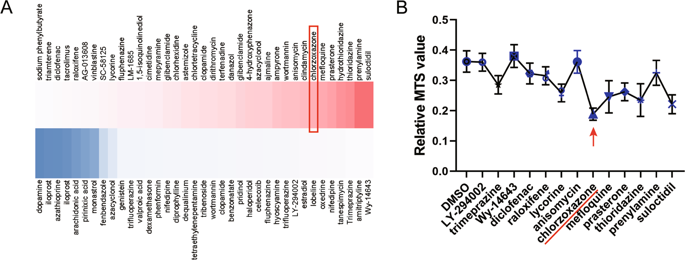当前位置:
X-MOL 学术
›
Cell Death Dis.
›
论文详情
Our official English website, www.x-mol.net, welcomes your
feedback! (Note: you will need to create a separate account there.)
Chlorzoxazone, a small molecule drug, augments immunosuppressive capacity of mesenchymal stem cells via modulation of FOXO3 phosphorylation.
Cell Death & Disease ( IF 8.1 ) Pub Date : 2020-03-02 , DOI: 10.1038/s41419-020-2357-8 Luchan Deng 1 , Hongling Li 1 , Xiaodong Su 2 , Yingjie Zhang 3 , Haoying Xu 1 , Linyuan Fan 1 , Junfen Fan 1 , Qin Han 1 , Xueyuan Bai 3 , Robert Chunhua Zhao 4
Cell Death & Disease ( IF 8.1 ) Pub Date : 2020-03-02 , DOI: 10.1038/s41419-020-2357-8 Luchan Deng 1 , Hongling Li 1 , Xiaodong Su 2 , Yingjie Zhang 3 , Haoying Xu 1 , Linyuan Fan 1 , Junfen Fan 1 , Qin Han 1 , Xueyuan Bai 3 , Robert Chunhua Zhao 4
Affiliation

|
Nowadays, immune diseases are a large burden in healthcare. Mesenchymal stem cells (MSCs) have prominent ability in immunomodulation and have been applicated on treating many immune-related diseases. However, the clinical outcomes can be disparate and sometimes completely counterproductive beyond explanation of cell heterogeneity. The theory of immunomodulation plasticity in MSCs has then emerged to explain that MSCs can be induced into proinflammatory MSC1 or anti-inflammatory MSC2 responding to different immune environment. It would be safer and more efficient if we could induce MSCs into a certain immune phenotype, in most cases MSC2, prior to medical treatment. In this study, we screened and identified a classical FDA-approved drug, chlorzoxazone (CZ). Unlike traditional method induced by IFN-γ, CZ can induce MSC into MSC2 phenotype and enhance the immunosuppressive capacity without elevation of immunogenicity of MSCs. CZ-treated MSCs can better inhibit T cells activation and proliferation, promote expression of IDO and other immune mediators in vitro, and alleviate inflammatory infiltration and tissue damage in acute kidney injury rat model more effectively. Moreover, we discovered that CZ modulates phosphorylation of transcriptional factor forkhead box O3 (FOXO3) independent of classical AKT or ERK signaling pathways, to promote expression of downstream immune-related genes, therefore contributing to augmentation of MSCs immunosuppressive capacity. Our study established a novel and effective approach to induce MSC2, which is ready for clinical application.
中文翻译:

氯唑沙宗是一种小分子药物,通过调节 FOXO3 磷酸化来增强间充质干细胞的免疫抑制能力。
如今,免疫疾病是医疗保健的巨大负担。间充质干细胞(MSCs)具有突出的免疫调节能力,已被应用于治疗多种免疫相关疾病。然而,临床结果可能各不相同,有时甚至完全适得其反,无法解释细胞异质性。随后出现了MSCs免疫调节可塑性理论,解释MSCs可以响应不同的免疫环境而诱导产生促炎性MSC1或抗炎性MSC2。如果我们能够在医学治疗之前诱导 MSC 进入某种免疫表型(大多数情况下是 MSC2),那就更安全、更有效。在这项研究中,我们筛选并鉴定了 FDA 批准的经典药物氯唑沙宗 (CZ)。与传统的IFN-γ诱导方法不同,CZ可以诱导MSC转变为MSC2表型,增强免疫抑制能力,而不会提高MSC的免疫原性。 CZ处理的MSC能够更好地抑制T细胞活化和增殖,在体外促进IDO和其他免疫介质的表达,更有效地减轻急性肾损伤大鼠模型的炎症浸润和组织损伤。此外,我们发现CZ独立于经典的AKT或ERK信号通路调节转录因子叉头框O3(FOXO3)的磷酸化,以促进下游免疫相关基因的表达,从而有助于增强MSC的免疫抑制能力。我们的研究建立了一种新颖有效的诱导 MSC2 的方法,已准备好用于临床应用。
更新日期:2020-03-02
中文翻译:

氯唑沙宗是一种小分子药物,通过调节 FOXO3 磷酸化来增强间充质干细胞的免疫抑制能力。
如今,免疫疾病是医疗保健的巨大负担。间充质干细胞(MSCs)具有突出的免疫调节能力,已被应用于治疗多种免疫相关疾病。然而,临床结果可能各不相同,有时甚至完全适得其反,无法解释细胞异质性。随后出现了MSCs免疫调节可塑性理论,解释MSCs可以响应不同的免疫环境而诱导产生促炎性MSC1或抗炎性MSC2。如果我们能够在医学治疗之前诱导 MSC 进入某种免疫表型(大多数情况下是 MSC2),那就更安全、更有效。在这项研究中,我们筛选并鉴定了 FDA 批准的经典药物氯唑沙宗 (CZ)。与传统的IFN-γ诱导方法不同,CZ可以诱导MSC转变为MSC2表型,增强免疫抑制能力,而不会提高MSC的免疫原性。 CZ处理的MSC能够更好地抑制T细胞活化和增殖,在体外促进IDO和其他免疫介质的表达,更有效地减轻急性肾损伤大鼠模型的炎症浸润和组织损伤。此外,我们发现CZ独立于经典的AKT或ERK信号通路调节转录因子叉头框O3(FOXO3)的磷酸化,以促进下游免疫相关基因的表达,从而有助于增强MSC的免疫抑制能力。我们的研究建立了一种新颖有效的诱导 MSC2 的方法,已准备好用于临床应用。











































 京公网安备 11010802027423号
京公网安备 11010802027423号